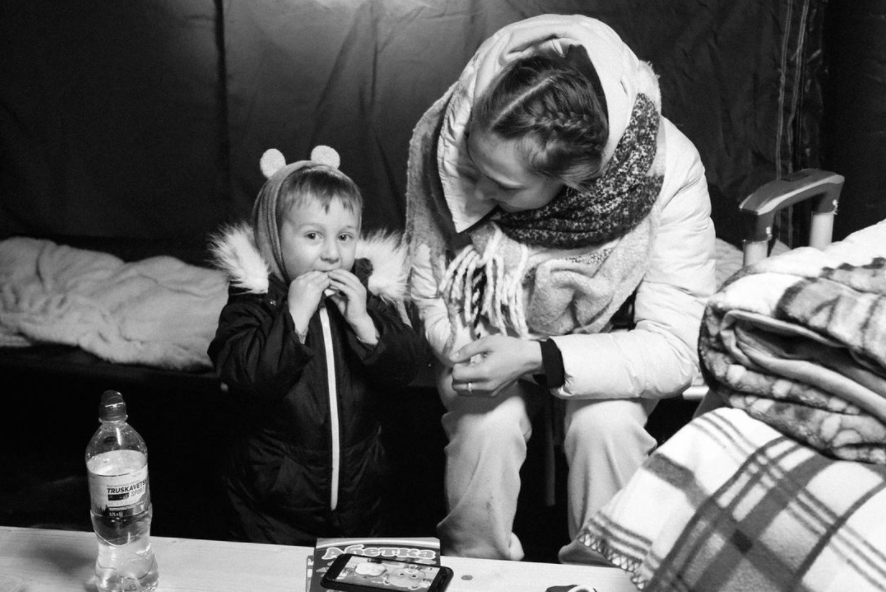Talking to Children about the War in Ukraine

The outbreak of war in Europe has left many feeling worried about the future of an already unstable world. In the two weeks since Russia began its invasion of Ukraine, thousands have lost their lives, and over two million people have fled their homes in search of safety. The price of energy, food, and nearly everything else we buy is increasing rapidly, and hostilities are likely to escalate further in the coming weeks. The images we see are heartbreaking, and children–even those half a world away– are not immune to the feelings of anxiety they create.
In an age when information itself has become a weapon, the media landscape can resemble a battlefield. Those following the conflict are left to evaluate competing narratives and separate fact from fiction in online spaces teeming with bad actors. What’s more, social media platforms have given users an unprecedented look into the lives of those directly experiencing the war’s hardships. The sanitized image of conflict provided by traditional news outlets becomes irrelevant when anyone with a phone can easily view the conflict’s worst manifestations on TikTok, Twitter, and Instagram. Exposure to this kind of violence at any age can be traumatizing, but young people are uniquely susceptible to psychological distress as they try to understand the nature and causes of this tragic event.
It is important to remember that even before the invasion, children were growing up in a strange, changing world. The stability which many of us took for granted during our own adolescence has been deeply unsettled by the coronavirus, economic recession, social division, and institutional failure. Parents and educators are left to decide how to appropriately engage with young people about the complex events that affect all of us. Often this means addressing questions with no clear answer: Why do good people suffer? Who are the good guys? Is there such thing as a just war?
In having these conversations, a few basic principles can pave the way for productive conversations about war and tragedy. First and foremost, caring adults should make it clear to young people that they are safe and that any negative feelings they have towards the war will be respected. They ought to be honest about what they don’t know and encourage a healthy amount of skepticism towards the things their children may read online. As terrible as they are, events like these can teach us meaningful lessons about accepting the things that we cannot control.
Like anything else, these conversations will also be heavily dependent on the maturity of the child in question. For young children, parents should carefully consider how much information their child can handle and reasonably understand. For some older children and young adults, learning about the conflict can be an appropriate coping strategy; maps, documentaries, and books can give clarity and meaning to what would otherwise appear to be aimless acts of violence. On the other hand, some children may benefit from limiting screen time creating distance between themselves and the news cycle. In any case, it is important to remind them that it’s ok to be a kid and enjoy life even during times of hardship.
No matter who your child is or how mature they may be, however, the tragic events in Ukraine should serve as an important lesson in compassion. In the challenges that will inevitably persist in the months ahead, encouraging a sense of gratitude in our children for the relative safety that they were born into can help them develop a sense of empathy and responsibility towards those who were not given the same gift. If they express a desire to help those affected by the war, encourage them to do so by providing donations or volunteering with them.
Parents and educators bear a heavy responsibility to be hopeful right now. Cynicism may appear to be a rational position when so many good, ordinary people suffer under forces that are far beyond their control. Yet in embracing cynicism, we risk imparting a sense of powerlessness in those who have long futures ahead of them. Optimism is hard, but it is fundamentally constructive. It is a principle that guides young minds to solutions instead of resigning them to the world’s imperfections. In this formative moment for so many young people, it is the adults who must lead by example and demonstrate that it is possible to build a better world through kindness and understanding.
The war in Ukraine has created the greatest humanitarian crisis in Europe in decades. If you would like to help those affected by the conflict, consider making a donation to the United Nations Children Fund (UNICEF) or Refugee Agency (UNHCR).
